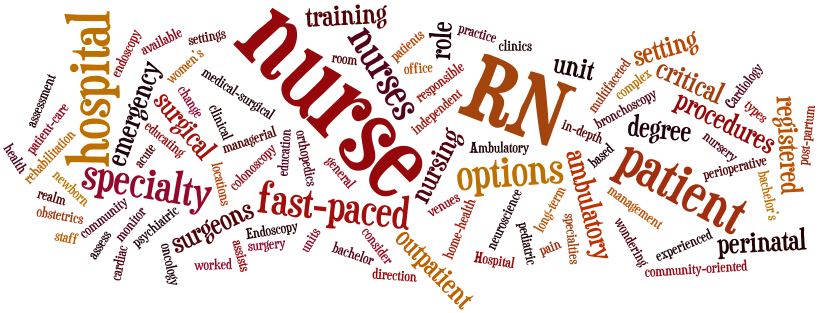 What direction to take?
What direction to take?
With a bachelor in nursing degree, you have worked as a staff nurse on a general medical-surgical unit for two to five years, and you find yourself wondering if you should make a change. There are many options available to you: continue in a structured, multifaceted, direct patient-care setting like a hospital unit, move to a fast-paced unit like emergency room or critical care, consider a more independent, community-oriented role as a home health nurse, or contemplate a managerial role as a pain management nurse.
Over 100 different nursing specialties exist for an experienced bachelor’s degree nurse! Settings vary from ambulatory care, hospital units, hospital specialty situations, long-term care venues, school locations, community locations, and rehabilitation sites.
Ambulatory or outpatient care settings provide a wide range of options. Cardiology clinics use nurses to assess patients, run electrocardiograms and deliver patient education. Plastic surgeons utilize nurses to assist with office based surgical procedures, to monitor the patient after the surgery and be responsible for educating the patient. Endoscopy centers use registered nurses in similar approaches to the plastic surgeons, but the nurse assists with endoscopy procedures (e.g., bronchoscopy, esophagogastroduodenoscopy, and colonoscopy). These are just a few of the many options in ambulatory or outpatient care settings.
Hospital units offer an assortment of different types of clinical practice settings. The emergency room and critical care, both fast-paced settings, require further training about electrocardiogram readings, vasoactive drugs, pulmonary artery catheter readings and in-depth assessment of complex patient conditions. Another fast-paced setting in the hospital involves the maternal-child or perinatal location where obstetrics, newborn nursery and post-partum care occur. The registered nurse enters the realm of women’s health in maternal-child acute care by taking care of women during labor and delivery, assisting with Cesarean-sections, or caring for neonates. The perinatal nurse requires specialty training on electronic fetal heart monitoring, oxytocin/uterotonic drugs, epidural anesthesia, post-partum hemorrhage, and lactation. Some other specialty areas include orthopedics, oncology, neuroscience, burn units, otorhinolaryngology, cardiac care, pediatric, perioperative (surgical), telemetry and psychiatric nurse, to name a few.
Hospital specialty situations exist for the nurse to consider as well. A radiology nurse cares for patients undergoing x-ray procedures. The nurse needs to comprehend the effects of the radiology contrast drugs (e.g., gadolinium-based, nonionic contrasts, iodinated contrast), care of sedated patients, know the components of MRI safety, and understand the care of patients undergoing interventional radiology or nuclear medicine tests. The infection control or infection prevention nurse works to prevent infections in the institution. The infection control role involves studying patients’ bacteria to detect infections possibly arising from the healthcare setting. The Wound and Ostomy Nurse represents another hospital specialty nurse to consider. This nurse treats patients with wounds produced by medical treatment disease or injury as well as ostomies created surgically. The position requires knowledge of the healing process, types of dressings and ostomy appliances. Other nurse specialty positions include cardiac catheterization nurse, managed care nurse, utilization review nurse, quality assurance nurse, and case management nurse.
Long-term care venues comprise rehabilitation facilities, skilled nursing facilities, assisted living facilities and hospice care facilities. Rehabilitation and hospice settings provide temporary long-term care. Rehabilitation helps return individuals to their previous state of health or to a functioning level to return home. Hospice care involves palliative services for patients with terminal medical conditions. In contrast to the goals for these two above settings, skilled nursing facilities and assisted living facilities provide care to maintain or slow the deterioration of a patient’s condition, especially in the elderly population.
Community sites for nurses constitute locations like schools, correctional facilities, home health services, and public health nurses. Schools comprise all levels of education (elementary, high school and college). The nurse in the school setting requires knowledge of developmental stages, childhood disabilities, and medications common to childhood and young adulthood. Correctional facilities (e.g., prisons, jails, penitentiaries and juvenile detention centers) provide a challenging environment for nurses to work due to a lack of knowledge about the medical history of the patient. The nurses working with the incarcerated client needs to be knowledgeable about HIV, AIDS, substance abuse, and mental illness, on top of any chronic health problems. Public Health offers a community perspective to the nurse’s role. The Public Health Nurse works in public health clinics and promotes immunizations, follow-ups on sexually transmitted disease and monitors growth, and development of low income children. Further opportunities in the community include home health nurse, domestic violence nurse, travel nurse (cruise lines), poison information specialist, forensic nurse, flight/transport nurse and military nurse.
In conclusion, you can choose from many diverse possibilities to jump- start your career. You should always research your job of interest ahead of time to ascertain what the area of responsibility requires in relation to skills and education. If you pick a position that you possess a burning desire to pursue, you will be more likely to exude enthusiasm when interviewing for your job of interest. So find the nurse position of your dreams, go full speed ahead, and jump into a new nursing experience.
References
Cheesman, S. D. (2013). Nursing a job with endless possibilities. South Carolina Nurse, 20(3), 7.
Johnson & Johnson (2014). Nursing Specialties. Available from http://www.discovernursing.com/explore-specialties#characteristics=research-oriented
Ohler, L. (2013). Pacesetters and pathfinders: an interview with Amy S. Peele, RN. Progress in Transplantation, 23(4), 300-301.
Previous Article: Now you are graduated as a new nurse, what next..

Everyone already knows being a nurse provides a lot of options. I think this article would have been better if it focused more on specific steps to qualify yourself for the more advanced career paths.
I have found the best staff of nursing at Plastic surgeons Honolulu.all of the people their very cooperative and expert.
thanks Sharon for such an insightful post .